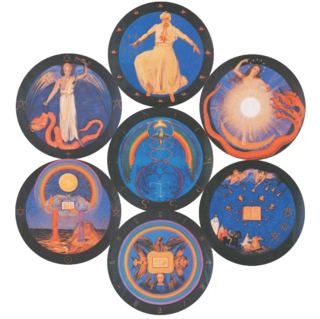
Anthroposophy is a philosophy founded in the early 20th century by the esotericist Rudolf Steiner that postulates the existence of an objective, intellectually comprehensible spiritual world, accessible to human experience. Followers of anthroposophy aim to develop mental faculties of spiritual discovery through a mode of thought independent of sensory experience. They also aim to present their ideas in a manner verifiable by rational discourse and specifically seek a precision and clarity in studying the spiritual world mirroring that obtained by scientists investigating the physical world.
Subud, acronym of Susila Budhi Dharma, is an international spiritual movement that began in Indonesia in the 1920s, founded by Muhammad Subuh Sumohadiwidjojo (1901-1987). The basis of Subud is a spiritual exercise called the latihan kejiwaan, which was said by Muhammad Subuh to represent guidance from "the Power of God" or "the Great Life Force". He claimed that Subud was not a new teaching or religion, and recommended that Subud members practice an established religion; he left the choice of religion up to the individual. Some members have converted to Islam; others have found that their faith in and practice of Christianity or Judaism, for example, has deepened after practising the latihan. There are Subud groups in about 83 countries, with a worldwide membership of about 10,000.
John Godolphin Bennett was a British scientist, technologist, industrial research director, and author. He is best known for his books on psychology and spirituality, particularly on the teachings of G. I. Gurdjieff. Bennett met Gurdjieff in Istanbul in October 1920 and later helped to co-ordinate the work of Gurdjieff in England after the guru had moved to Paris. He also was active in starting the British section of the Subud movement, and co-founded its British headquarters.
Kawi, or Old Javanese, is the oldest attested phase of the Javanese language. It was spoken in the eastern part of what is now Central Java and the whole of East Java, Indonesia. As a literary language, Kawi was used across Java and on the islands of Madura, Bali and Lombok. It had a sizable vocabulary of Sanskrit loanwords but had not yet developed the formal krama language register, to be used with one's social superiors, that is so characteristic of modern Javanese.
The following outline is provided as an overview of and topical guide to spirituality:

The English Teacher is a 1945 novel written by R. K. Narayan. It is a part of a series of novels and collections of short stories set in "Malgudi". The English Teacher was preceded by Swami and Friends (1935), The Bachelor of Arts (1937) and Malgudi Days (1943) and followed by Mr. Sampath – The Printer of Malgudi.
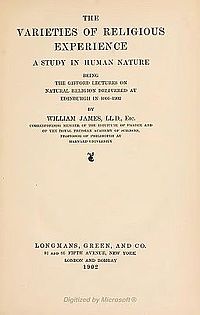
The Varieties of Religious Experience: A Study in Human Nature is a book by Harvard University psychologist and philosopher William James. It comprises his edited Gifford Lectures on natural theology, which were delivered at the University of Edinburgh, Scotland between 1901 and 1902. The lectures concerned the psychological study of individual private religious experiences and mysticism, and used a range of examples to identify commonalities in religious experiences across traditions.

Sefirot, meaning emanations, are the 10 attributes/emanations in Kabbalah, through which Ein Sof reveals Himself and continuously creates both the physical realm and the chain of higher metaphysical realms. The term is alternatively transliterated into English as sephirot/sephiroth, singular sefirah/sephirah etc.

The Rosicrucian Cosmo-Conception or Mystic Christianity is a Rosicrucian text by Max Heindel, first published in 1909.
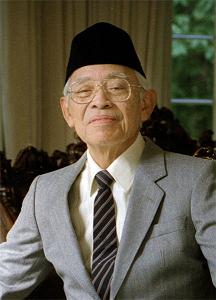
Muhammad Subuh Sumohadiwidjojo was an Indonesian who founded the movement known as Subud. As a young man Muhammad Subuh claims to have received a series of intense experiences that he believed gave him contact with a spiritual energy from a higher power. By the 1930s, he believed that it was his task to transmit this energy - which he called latihan kejiwaan - to others, but that he was not to seek people out but simply to wait for those who asked for it.
The Subud International Cultural Association (SICA) was founded in 1983 by a group of artists, educators, and cultural activists attending an international gathering of Subud members in the UK. They represented creative disciplines across all sectors, and they came from many nations. Their intention was:
The Muhammad Subuh Foundation (MSF) is a charitable foundation named in honor of Muhammad Subuh Sumohadiwidjojo, the founder of Subud. It is a non-profit, tax-exempt body constituted in the Commonwealth of Virginia. Its major functions are to finance the purchase and construction of Subud centers, and to preserve and disseminate the writings and talks of Bapak, including his definitive book, published in 1952, Susila Budhi Dharma.
Latihan is a form of spiritual practice. It is the principal practice of the Subud organization.
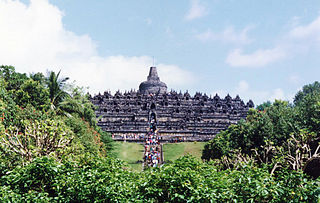
Kejawèn or Javanism, also called Kebatinan, Agama Jawa, and Kepercayaan, is a Javanese religious tradition, consisting of an amalgam of animistic, Buddhist, and Hindu aspects. It is rooted in Javanese history and religiosity, syncretizing aspects of different religions.
This is a glossary of spirituality-related terms. Spirituality is closely linked to religion.

Students of Ascended Master Teachings organizations believe that their doctrine has been given to humanity by the Ascended Masters, individuals believed to have lived in physical bodies, acquired the wisdom and mastery needed to become immortal and free of the cycles of "re-embodiment" and karma, and have attained their "ascension", a state of "one-ness" with God. This knowledge is believed to have previously been taught for millions of years only within "Ascended master retreats" and "Mystery schools".
Marshall Vian Summers is an American author and spiritual teacher who offers retreats, online broadcasts and events in the United States and abroad. He is the author of numerous books and podcasts, and is the founder of The Society for the New Message, a religious nonprofit organization established in 1992 which supports and makes available his books and teachings. He is the central figure within a new religious movement with an emphasis on the implications of exotheology for human evolution. His followers and he designate themselves the Worldwide Community of the New Message from God. His books are the basis for their beliefs and guiding principles, which break down categorically into warnings of extreme change and outside threat; and gifts of spiritual blessing and preparation for living in a world in decline.
John Starr Cooke was an American mystic and spiritual teacher who influenced the development of the counterculture movement that emerged in San Francisco during 1966–1967. His teachings were based on the doctrine of “One Consciousness”, which Cooke believed was communicated to him through a Ouija board in the early 1960s. He designed three original decks of Tarot cards: T: The New Tarot for the Aquarian Age, the Atlantean Tarot (1992), and the Medieval Tarot (1992).
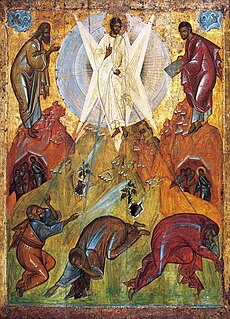
Christian contemplation, from contemplatio, refers to several Christian practices which aim at "looking at", "gazing at", "being aware of" God or the Divine. It includes several practices and theological concepts, and until the sixth century the practice of what is now called mysticism was referred to by the term contemplatio, c.q. theoria.

Transcendence: My Spiritual Experiences with Pramukh Swamiji is the second last book written by A. P. J. Abdul Kalam, the eleventh President of India and a pioneering scientist. Co-authored by Professor Arun Tiwari and published by HarperCollins India, the book describes Kalam's spiritual experiences with and reflections on Pramukh Swami Maharaj, the guru and spiritual leader of the BAPS Hindu organization. Kalam recounted the spiritual transformation he experienced during his fourteen-year association with Pramukh Swami, described the inspiration he obtained from Pramukh Swami's leadership of BAPS, and expressed his vision for a society in which science and spirituality are fused. Kalam stated that he saw in Pramukh Swami “a true embodiment of transcendence,” and titled the book to reflect his belief that Pramukh Swami is gunatit, a term signifying transcendence of ephemeral qualities and the modes of nature.










